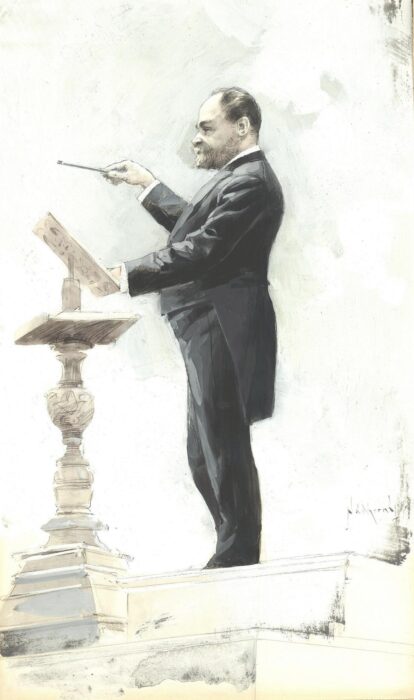CSO’s Dvořák Festival closes with a generous serving of rarities

One hundred and sixteen years ago in Chicago, a short, bearded man with an intense gaze mounted the podium at the World’s Columbian Exposition, gave the downbeat and led a 114-member orchestra in his recently composed Slavonic Dances and stirring overture, My Homeland.
Antonin Dvořák would undoubtedly be delighted by the artistic success and audience popularity of the Chicago Symphony Orchestra’s festival devoted to his music, which has served up terrific, idiomatic performances under Sir Mark Elder over the past three weeks.
Thursday night’s program, which will be repeated in the final festival concert Saturday, was the most adventurous of the entire series, with Elder and the orchestra joined by three guest artists and the CSO Chorus in an array of far-flung Dvořákiana.
Most of the works were being played by the Chicago Symphony for the very first time, though there were a few of the Czech composer’s “greatest hits” spicing the program as well. The first three of Dvořák’s Op. 72 Slavonic Dances received fizzing, brilliant accounts that impressed one anew at these marvels of bracing melody, colorful scoring and rhythmic ingenuity.
Rachel Barton Pine delivered a highlight with Dvořák’s Romance for Violin, here rendered with tonal refinement and chaste purity, shearing off the accumulated schmaltz larded on this work by big-name fiddlers.
But it was the evening’s rarities that made this final program so fascinating. Originally written as a prelude to incidental music for a long-forgotten patriotic play, My Homeland is cast in Dvořák’s best national style, with effective use of folk tunes, including a song that became part of the Czech National Anthem. In its first CSO performance in over a century, the overture was given a stirring and aptly heroic performance by Elder and the orchestra.
The spotlight was on vocal music for much of the evening with soprano Patricia Racette making her belated subscription debut.
Racette has been a popular presence at the Lyric Opera but got off to a shaky start Thursday night. In a gorgeous aria (“O dovol, o dovol“) from Dvořák’s obscure oratorio, Saint Ludmila, Racette’s soprano sounded fluttery and shallow of tone, and, though she sang with more concentrated expression in Rusalka‘s not obscure Song to the Moon, she failed to convey the aria’s heart-breaking sadness.
Racette was heard to better advantage in the two larger works of the evening. Elder’s original desire to perform a complete Dvořák opera fell victim to economic considerations, but the Act 1 excerpt from The Jacobin certainly whetted one’s appetite for other neglected Dvořák stage works.
The scenario concerns a married couple (a rare thing in opera) caught up in a scenario involving conflicts between family, art and national loyalties. In the Act 1 excerpt, the couple, Bohus and Julie arrive in the former’s hometown as the choir sings in the local church. Wagner’s long shadow is still evident in this early work’s rather grandiloquent religiosity, but the majestic, impassioned finale to Act 1 with soloists, chorus and orchestra set soaring was enough to send one to Amazon in search of a complete recording.
In the extended duet, Racette performed with committed emotional expression, but Philip Cutlip stole the show. The young singer, also making his CSO debut, showed commanding vocalism, bringing a stentorian, firmly focused baritone and echt-Slavic timbre to the music.
Orchestra musicians often deride Bruckner’s Te Deum as his “Te-dium,” but one surely cannot say that of Dvořák’s setting of the same Latin text.
There are moments of sublime beauty in this 19-minute work, reflective of Dvořák’s deep and abiding faith. Yet most striking, under Elder’s incisive direction, was the primitive feel to so much of the music. Indeed, the pounding timpani that opens the work, the angular string figures and pungent harmonies powerfully paint Bohemia’s pagan past, and Janacek’s Glagolitic Mass is clearly visible on the horizon.
Racette provided her finest singing of the evening in the Te Deum, with a radiant account of the solo in the Sanctus, and Cutlip was a superb soloist as well, some disarray in the final pages apart.
There were fitful ensemble slips Thursday, betraying signs of fatigue in the orchestra at the end of a long season. Still, Elder led a dynamic performance of the Te Deum, displaying the same energetic and idiomatic direction that has enlivened his partnership with the CSO throughout this series. Duain Wolfe’s chorus sang magnificently in The Jacobin excerpt and Te Deum, providing a majestic coda to the Dvořák Festival and sealing the CSO season in style.
The program will be repeated 8 p.m. Saturday. www.cso.org; 312-294-3000.
Posted in Performances




